Do you feel it, scummer? The whispers of the warp? If so, you’re in the right place: this week we’re taking an in-depth look at Necromunda’s psychic denizens.
Necromunda’s warp-touched denizens have been in a wyrd place for a while.
Despite a big expansion to the variety of powers and accessibility of psykers via the Book of the Outcast, usability has for some time been plagued by rules jank. Thankfully, with the new Core Rulebook, the key remaining hurdle — the logistical difficulty of using certain powers — has been crossed, and wyrds can finally live up to their full potential.
Is psyker season finally here? Here’s what you need to know.
Table of Contents
Who you calling Wyrd?
Psykers of Necromunda
As Necromunda’s ruleset has gradually expanded, psykers have popped up all over the place.
There are two main types of psykers, one of which is superior to the other:
— Sanctioned psykers: This rarer variety of psyker can re-roll one failed Willpower test per battle.
— Non-sanctioned psykers: these meat-and-potato psykers grant your opponent D3x10 creds if taken out of action. If captured, they are worth their full value if sold to the guilders, AND can be immediately sold without a Rescue Mission. Ouch!
Despite this theoretically simple binary taxonomy, Games Workshop keeps us on our toes in the new rulebook by giving the Gyrinx Cat the ‘Psyker’ rule. Your guess is as good as ours.
Getting Wyrd
Nearly all gangs can, one way or another, find a way to get a dedicated psyker into their lists, but the number of ways to do so varies greatly. Overall, Outlaw gangs have broader access than their Law Abiding counterparts. Delaque are the standouts, with psyker access all over their house list, while Genestealers, Helot Cults and Venators can all take psykers from their lists. Outcast leaders and champions can choose the Wyrd archetype and tap into some warp energy.
Other gangs have to try a bit harder. Any Law Abiding or Outlaw gang can hire a psyker generic bounty hunter, or buy a Gyrinx cat, while Outlaws can recruit the Awakened Ogryn brute. There’s also a smattering of psyker Dramatis Personae.
Any House gang (Cawdor/Delaque/Escher/Goliath/Orlock/Van Saar) can also make their leader a psyker by become corrupted by Tzeentch or by joining a Genestealer Cult.
Finally, an alliance with the Psi-Syndica lets one fighter become a non-sanctioned psyker. There are also some ways fighters can temporarily become psykers, such as by consuming Ghast. Despite all these paths, psykers remain fairly rare, in our experience.
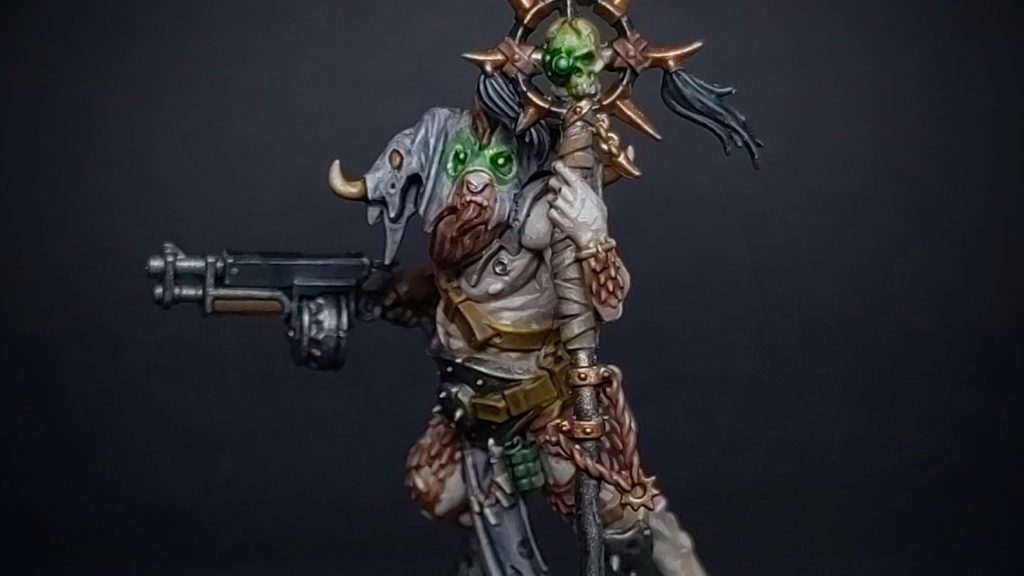
Psykers on the board
Using powers
Psychic powers work like actions, which is to say they come in a range of occasionally-confusing varieties. In this case, the possibilities are Simple, Basic, Double and Special — the last, you guessed it, special kind of effect that takes place outside of the normal game flow.
Some powers are also Continuous, which means they last until the end of the psyker’s next activation.
Using psychic powers is pretty simple. To manifest a power, you simply have to pass a Willpower check. Snake Eyes (1,1) or Box Cars (6,6) will trigger a Perils of the Warp outcome, which can be fun but sadly doesn’t trigger very often.
Psykers can take a Concentrate (Basic) action to improve their Willpower check by +1, a move akin to aiming. They can also use Maintain Control, passing a Willpower test to keep a Continuous Power going until their next activation. Maintain Control can be either (Simple), in which case the psyker gets a +3 bonus to the test, or free, in which case they get no bonus and can’t manifest another power if the test is failed.
Disruption
Nearby enemy psykers can try to Disrupt a power from manifesting when it is cast, triggering a Psychic Duel. Doing so does not cost them their ready marker. The disruptor rolls 2d6 — if the outcome is higher than the casting roll, the power is nullified.
Oddly, this means all psykers are equally capable of successful Disruption, regardless of their Willpower stat. Disruption rolls can trigger Perils of the Warp, so it’s not totally risk-free.
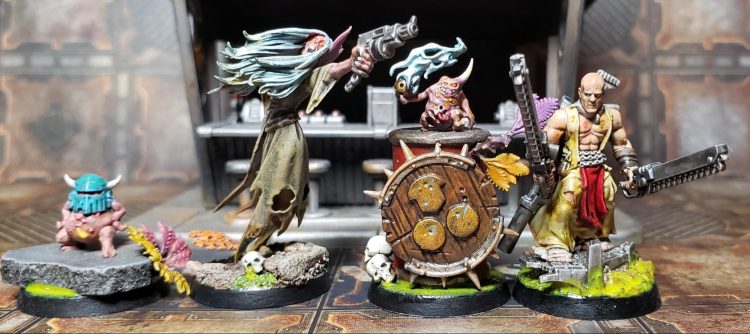
Picking powers
Until Book of the Outcast, psykers were generally restricted to a small pool of powers, which tended to be unique to individual psykers or gang lists. There was a lot of crossover.
BoO changed the game with a major introduction: seven generic wyrd powers disciplines, each consisting of six themed powers. These powers are accessible to ALL psykers, seemingly overriding previous restrictions. Plus, any psyker who picks powers from only one discipline gets a special power as a handy extra bonus.
BoO is quite specific about how these powers can be used: any psyker can choose them as an advancement by generating one randomly for 9XP, or picking one for 12XP. It also says, without further caveats, that all psykers (unless otherwise specified) start with a wyrd power — which is important.
There are two key takeaways from this rule setup:
— Many fighters have to take a power from another list before they can use the BoO disciplines (most notably Delaque, who must take a Psychoteric Whisper as part of their psyker-tude).
— Some psykers that can get a free skill or a wyrd power at recruitment (eg a Venator leader with a psyker upgrade) should always pick a regular skill, because they will still get a power anyway. This works as a buff for certain fighters (such as Cult Witches and GSC Alphas) that previously had to give up a skill to start with a power.
One quick further note on wyrd powers: the BoO disciplines incorporated the existing wyrd powers, but it isn’t always specified that the old powers are the same as the new powers. In the Book of Ruin, the Helot Cult and GSC powers all have specified disciplines, but this isn’t the case everywhere. We’d argue that if a power from some other list is replicated in the BoO disciplines, the user should be treated as specialised in that discipline (assuming they don’t have any clashing powers).
The ‘core’ powers
Alright, it’s what you (possibly) came for: all of the BoO disciplines and powers, gently reviewed. Grab your copy of Book of the Outcast and get thinking with us.
As ever, our ratings are more vibes than science, but we’ve favoured powers that are particularly strong or ubiquitous. Many lower-rated powers will also be strong, just only in specific circumstances.
Biomancy
Fast Healing (special ability): Rolling an extra injury dice while recovering is basically always good (although not getting seriously injured is obviously even better). Rating: A
- Arachnosis (Basic), Continuous Effect: Gaining a range of effects for climbing, falling and moving between buildings offers some interesting options for getting around and sneak attacks, but these powers are largely useless in Zone Mortalis and might be a bit niche elsewhere. Rating: C
- Chameleon (Basic), Continuous Effect: This power offers a similar benefit to a cameleoline cloak, but costs and action and then restricts what you can do for a further turn. Better options abound. Rating: D
- Cause Pain (Basic): This is a very strong offensive power: sure, you need to have already hurt the enemy you are targeting, but the flexibility to take a single wound off a brute of leader then keep forcing them to roll injury dice is very strong. Rating: A
- Stop Bleeding (Basic): Basically Cause Pain’s reverse, this is a solid power for bringing a wounded ally back up to strength, especially now Flesh Wounds are more present in the game. It heals only Flesh Wounds, not wounds, which limits its power. Rating: B
- Quickening (Basic), Continuous Effect: Quick movement and stat buffs are undeniably useful, but by invoking this power you’re majorly telegraphing your next move. Rating: B
- Iron Arm (Basic), Continuous Effect: An unmodifiable 5+ save made after armour rolls offers some solid tankiness, but the limitation to close combat is a shame. Part of the trouble is that in any situation where you’d want to use this, you’re probably better off just running away. Rating: C+
Overall rating: Lots of solid powers. B+
Chronomancy
Flicker (special ability): It’s a single use only, but having a triple-action turn is a tactics card-level power. It’s particularly worth considering how this synergises with Freeze Time and Zen Shootist. Rating: A
- Freeze Time (Double): Necromunda’s ultimate “stop everything” option — this power is potentially incredible if you can use it in a position where it will stop multiple enemies from making a full activation. This is particularly strong against number-heavy melee gangs, but it’s very hard to pull off and can backfire. Rating: B
- Suppress Power (Basic): Using your power to temporarily stop an enemy power is a losing game — and, if your opponent’s wyrd goes first, potentially useless. Probably one of the worst wyrd powers. Rating: E
- Zen Shootist (Basic), Continuous Effect: Generally guaranteed 2+ hits is a very strong effect — this can be looked at as a super Aim action, or, in combination with Flicker, allows for a very dangerous wombo combo. Rating: A
- Walk Through Walls (Double): An oddity of this power is that — because of the ZM restriction on measuring through walls — it doesn’t actually let you walk through Necromunda’s best-known walls. Still, it can allow a quick getaway or, perhaps unintentionally, sub in well for a ladder. Rating: B
- Mirror Image (Basic): Very meh. The optimum use case is way too niche. Rating: D
- Lucky Aura (Basic), Continuous Effect: Again, a pretty niche effect — it will come up clutch sometimes, but often you’ll find enemies will either choose a different target, just hit their re-roll anyway, or, in melee, having enough attacks that one re-roll barely matters. Rating: D
Overall rating: Strong but a bit limited. B
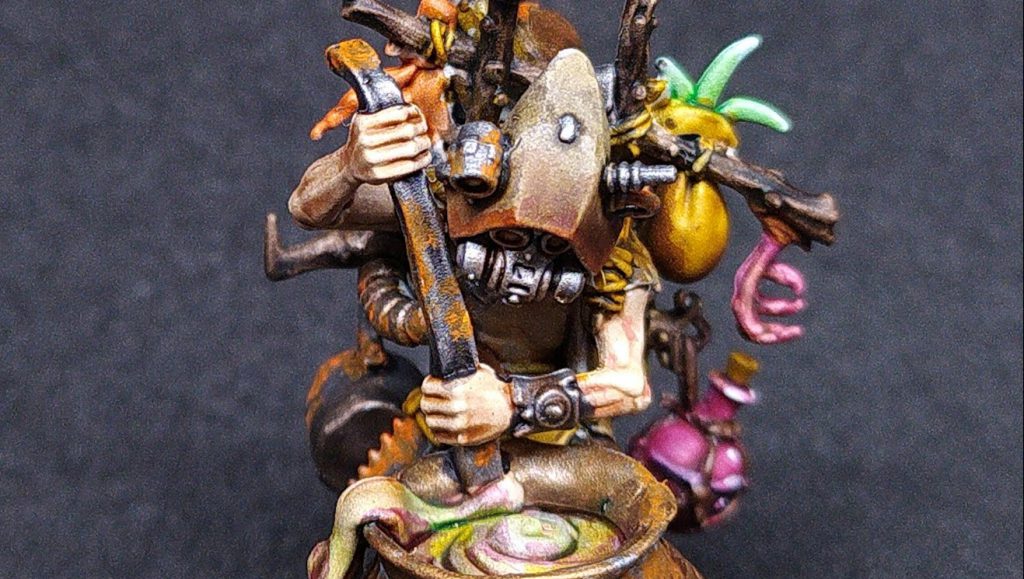
Divination
Future Sight (special ability): This is a potentially strong power on a melee fighter, as they (this is something of a contentious point) tend to roll dice in big groups, or someone packing a high-damage weapon. Decent. Rating: B
- Precognition (Special): In some campaign setups, being able to choose the scenario will be huge. In others, useless. Luckily, you should know which one applies before you pick this power. Rating: ??? (but potentially very strong)
- Foreboding (Double), Continuous Effects: Gaining the Overwatch power for the next turn is extremely meh. Giving it to an ally is quite a bit better. We see this is a very useful second power for a wyrd with a shooty buddy. Rating: B+
- Misfortune (Basic): The range and line of sight restriction make this pretty feeble. Rating: D
- Forewarning (Basic): On a long-range shooter trading fire with a distant enemy, this provides fantastic tankiness — but having to preempt the coming shot limits it. Rating: B+
- Warp Whispers (Special): A fun little pack of measures that will stack very nicely, especially in combination with Precognition. Rating: B
- Visions (Double), Continuous Effect: Mass revealing enemies is pretty strong in certain situations, and the user can safely use this while nestled safely out of sight. Rating: B
Overall rating: This is a hard one to rate overall. There’s a lot of stacking synergy, and in some setups it’s seriously powerful. B+
Pyromancy
Fire Shield (special ability): Immunity to Blaze, yay! Frees you up to get some proper armour. Obviously situational, but Blaze appears in a lot of situations. Rating: A
- Body of Flame (Basic), Continuous Effect: Against Cawdor or that meltagun Augmek, great. Against most things, useless. Probably not broadly useful enough. Rating: B-
- Stoke Flames (Basic): Turns a flaming enemy into a weaker incendiary charge. It feels like the stars aligning for an ideal use of this is quite unlikely. Rating: C
- Wall of Flames (Basic), Continuous Effect: This is more of less an incendiary charge with a delayed effect, but the ability to maintain it is quite nice, plus it can’t scatter. Potentially very strong for zoning. Rating: B+
- Flame Blast (Basic), Continuous Effect: Flaming swords are obviously fun, but we think it would be better to simply try and kill your opponent with the melee attacks, and save your power slot for something else. Rating: C
- Molten Bolt (Basic): Like a very short-ranged Meltagun, except because this attack has no short range, the Melta trade won’t ever proc. On the other hand, no scarce. Pretty deadly, although not all psykers are also competent shooters, and it’s obviously high-risk. Rating: A
- Scouring (Basic), Continuous Effect: Arms the psyker with a slightly weaker hand flamer — one that’s a little janky to use. You’re probably better off just buying a hand flamer, if possible. Rating: C
Overall rating: A big situational, but solid nonetheless. B
Technomancy
Special ability: Ammo check re-rolls are great if you have a gun. No further notes. Rating: A
- Weapon Jinx (Simple): Among the best powers in the game. No need for line of sight, AND it’s simple. Against gangs that rely on powerful scarce weapons (hello, Van Saar), a well-placed Weapon Jinx psyker can cause havoc. Rating: A+
- Overcharge (Basic), Continuous Effect: Making a weapon extra hurty but unstable is obviously best when the weapon is already unstable — but even if it isn’t, this is a tempting offer, particularly on rapid fire weapons like regular bolters (which effectively multiply the bonus damage). Obviously only certain psykers can make effective use of this.. Rating: A
- Hardening (Basic), Continuous Effect: Tankiness never goes out of fashion, this is solid. Rating: B+
- Manipulate Door (Simple): Opening and closing doors is typically only useful in Zone Mortalis, so it’s up to you decide whether you’re likely to use it. If you can, this allows for some wonderful tactical plays — using knockback to send an enemy into a doorway then closing it on them is one of the most satisfying wombo combos in Necromunda. Rating: B+
- Manipulate Lumens (Double): Again, you need to be prepared (photo goggles on), but if you’re prepared this can hand you a massive tactical advantage over your opponent. Rating: A
- Crack Lock (Basic): Opening locked doors is great when needed, but it’s the second part of this power — opening crates anywhere and choosing their contents — that is most interesting. Don’t just think about the ammo crates or the petty cash: watch how cautious your opponents get when any loot casket could suddenly turn into a melta bomb. Rating: B+
Overall rating: Full of excellent choices that provide either great synergy or tactical flexibility, particularly if you play on ZM a lot. Rating: A
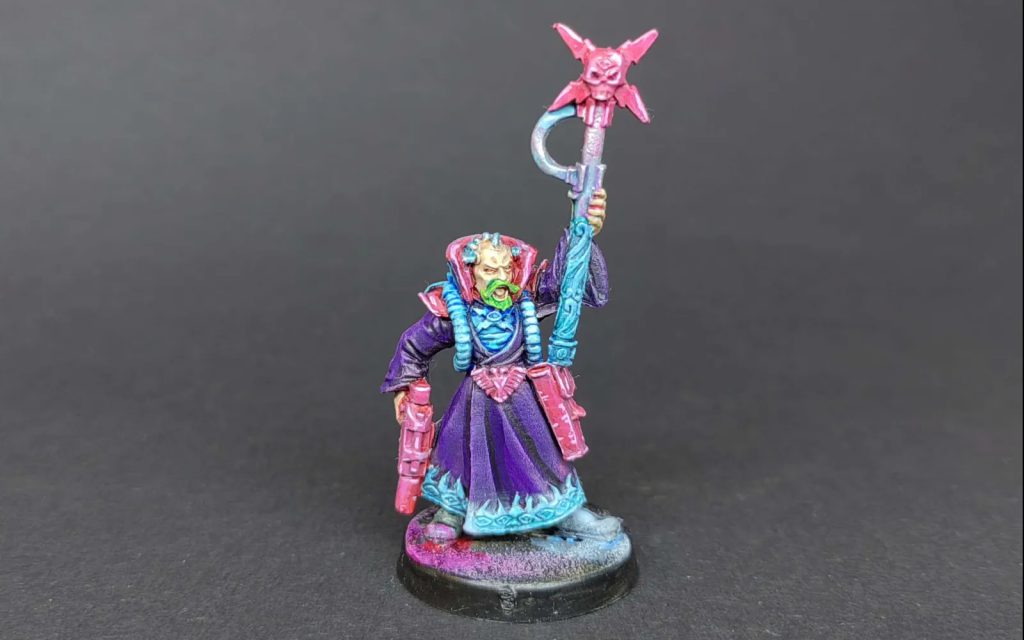
Telekinesis
Special ability: Improved unarmed attacks is a pretty situational benefit, and doesn’t particularly complement any of the other powers here. Rating: C
- Assail (Basic): It’s hard to hurt anyone with this, but if you can consistently land it (not a given for many psykers), it will reliably pin targets including those with mitigations like Nerves of Steel. Whether that’s a worthwhile use of your precious psyker is questionable. Rating: B-
- Crush (Basic): No, you didn’t misread: Crush effectively inverts the target’s armour save, and goes straight to an injury roll. Which may be excellent, especially against high-wound, high-toughness fighters with good armour (hello, Ambots). Rating: A
- Force Field (Basic), Continuous Effect: For various reasons, it’s often a bad idea to stand friendly fighters close to each other — often, this small buff won’t be worth potentially exposing yourself to a deadly blast or rapid fire burst. Rating: C
- Hailstorm (Basic): “Oooh no, please don’t hit me AND your allies with that S1 hit”, said no one ever. Basically a random number generator attack. Rating: D
- Force Blast (Basic): Forcing enemies to disengage is pretty nifty, although this is more of a second or third power choice. Rating: B
- Levitation (Basic), Continuous Effect: Flying can be extremely useful in certain situations — this power can let you grab a hard-to-reach objective and make your getaway, although you’re majorly telegraphing what your plan is. Rating: B
Overall rating: Several interesting powers but they’re very situational and there’s barely any synergy here. Rating: C
Telepathy
Special ability: Corpse Grinder mask-style protection is not to be sniffed at, particularly if you play against a lot of Goliaths or Ogryns. Rating: A
- Mind Control (Basic), Continuous Effect: It’s a bit odd that this is a Continuous Power — we guess that it just runs again if renewed. Potentially great, although you have to get very close up to use it, which makes it pretty high-risk. Rating: B
- Terrify (Double): Solid range, but terrifying’s biggest downside is how outclassed it is by Hallucinations. Plus it can only buy a bit of time at best. Rating: C
- Invisibility (Double), Continuous Effect: Being untargetable is nice, although at best this is going to help you correct a mistake. Rating: B-
- Mental Assault (Basic): It’s unclear why the opponent needs to make a Willpower check, as its outcome has no effect. Oh well. Like Assail, decent for pinning Nerves of Steel scaries. Rating: B
- Hallucinations (Basic): The power other powers wish they were. Decent 12″ range, no line of sight requirement, only basic and produces arguably the nastiest status effect in the game. Accept no imitations. Rating: A+
- Unbreakable Will (Basic), Continuous Effect: A potentially fun skill to hold together a psyker-heavy gang, which is another way of saying only certain Delaque lists can get much mileage out of this. It’s hard to rate a power that’s value is so tied to your wider list. Rating: ???
Overall rating: Just having Hallucinations would make this list excellent, but the other options also have their place. Rating: A
So where does that leave us? Well, setting someone on fire with your mind is always cool. While some powers are game changers, many of them are just cool. With the new core book changes, we are psyched to see much more viability, especially when paired with the Book of the Outcast for variety.
Want to share a cool psyker conversion! Have a question about builds? Drop us a line at Contact@Goonhammer.com.
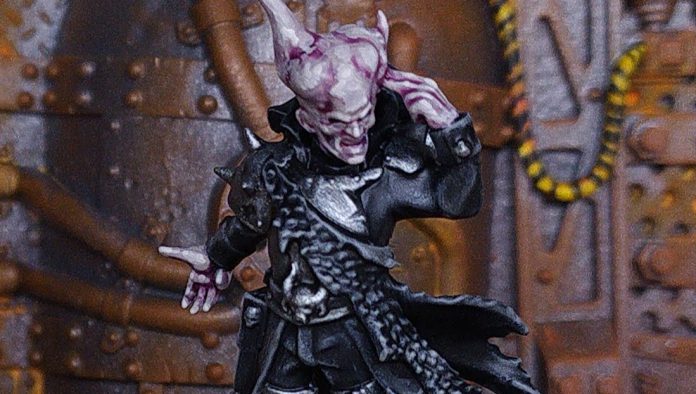


You must be logged in to post a comment.